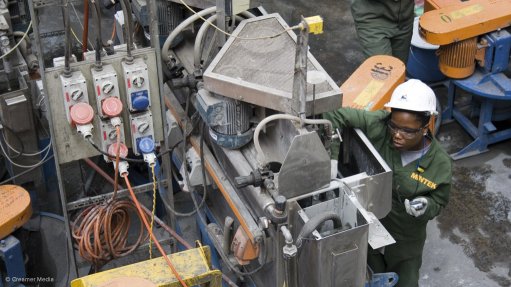
STIMULATING INDUSTRIALISATION
Mining and minerals beneficiation is important in providing invaluable contributions to downstream industries
Photo by: Duane Daws
South Africa is hosting 19 delegates from 13 Non-Aligned Movement (NAM) member States in a training programme to build capacity in minerals processing and beneficiation in these countries.
NAM is a movement of 115 members representing the interests and priorities of developing countries.
The three-month training programme, which opened on May 13 at South Africa’s State-owned mineral and metallurgical innovation company, Mintek, in Johannesburg, is a collaboration between the NAM Science and Technology (S&T) Centre, the Department of Science and Technology (DST), Mintek and the Department of Mineral Resources.
The DST notes that this is the second such NAM training programme that Mintek has hosted, with the first one having taken place in 2014. The DST states that Mintek has become a leading provider of minerals processing and metallurgical engineering products and services to industries worldwide.
“The training is expected to help NAM countries play a role in the new beneficiation drive to benefit their economic growth, industrialisation, skills development, technology transfer and innovation,” the DST explains.
The department says that developing countries, including South Africa, despite having large mineral resources, do not fully exploit these, owing to a lack of skills required to add value by advancing modern and innovative research and technology.
“For example, most African countries still export minerals as ores, including gold and platinum, without significant downstream processing that leads to value addition,” the DST points out.
The department comments that mining and minerals beneficiation are important in providing invaluable contributions for downstream industries, which hold the key to a country's industrial development.
The DST adds that mining is also an important source of foreign exchange, tax revenue, infrastructure creation and employment generation in developing countries, such as those affiliated to the NAM S&T Centre.
The participants, who are from Botswana, Egypt, Eritrea, India, Malaysia, Nigeria, Pakistan, South Africa, Sri Lanka, Sudan, Uganda, Zambia and Zimbabwe, will be exposed to Mintek's mineral processing techniques and undergo in-service training.
Policymakers and government officials will receive training on how to formulate policy and implement it in the minerals processing and beneficiation field.The DST highlights that the focus on processing options and technologies is meant for experts already working in the policy space, but who have limited exposure to modern, advanced and new ways of minerals processing and beneficiation.
Therefore, the focus is on basic minerals and mining research, as well as advanced minerals processing and mining, analytical capabilities and advanced beneficiation.
The beneficiation and technology focus will provide participants with the options best suited to their needs and the level of processing advancement in their respective countries.
Under this scheme, the DST is providing the programme’s delegates with a subsistence allowance of $300 a month, in South African rands, for meals and out-of-pocket expenses in South Africa for the duration of the fellowship.
Accommodation will be covered by the government of South Africa. However, the sending country or the candidates themselves are responsible for the arrangement of their international travel to and from South Africa.